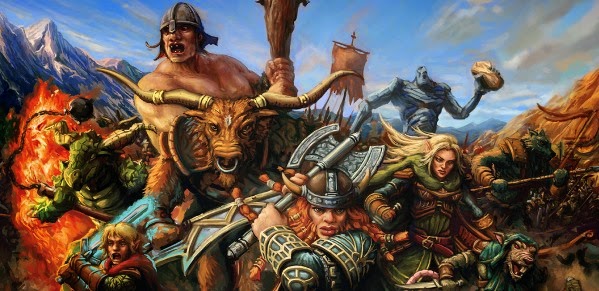
You’ll achieve this by training and promoting your troops, sending out scouts into enemy territory and raising taxes to pay for all of these shenanigans. Trying to describe how Warband works is going to be difficult. The best way to describe it is a ‘troop’ placement game. You get to place troops into the warband roster and the same with the scouts but you also get to lead the army into battle and vanquish your foes. What comes out the other end is a victory point pick and mix, meaning you have multiple routes to victory and you’re going to do that best by deploying your race’s special ability.
Each player takes control of a unique race of fantasy creatures and each race gets its own unique ability. It never gains any points but it does lean you towards one style of play. There are a lot of races to choose from so you’re going to get plenty of variety out of Warband but I can’t help feel that the abilities aren’t as balanced as they could be. One game I played had the Minotaurs practically owning the complete army because they can pay to avoid being killed.
But that really isn’t what this game is about. No this game is about getting your troops, captains and scouts into the top jobs of the darkness defeating business. It’s about waiting for your opponent to fill up the warband with their troops and then sending them into battle or choosing which battles will get rid of your opponent’s troops allowing your troops to fill the empty shoes of a detachment’s captain position. The whole game is a form of monster based nepotism. Once that clicks and you realise the game is really about getting your people in place and screwing the opposition the true way to play this game comes out. Speaking of messing with your opponents there are two options of regress cards to use, special bonus cards you get as a consolation for loosing troops in battle. One type of card adds a benefit to the user and the other hinders your opponents. My advice is to always play with the screw your opponent cards; they change the flavour of the game for the better.
Warband is a very mechanical game. It follows the well written and methodical systems that Dyskami have become known for, and even after a couple of turns of your first game the entire thing is running smoother than a greased eel sliding down a Teflon waterslide. This mechanical smoothness does come at a price, instead of feeling like a mighty warrior leading a horde of fantasy minions into battle you end up feeling like some form of fantastical project manager. Your job isn’t to bash the forces of darkness with your sword or axe, or even to command the battles from your general’s pavilion. Instead, your job is to ensure the armies are well stocked with your forces, that your scouts are evenly distributed and your coffers are sufficiently full to pay for all these activities.
And being a project manager is what makes Warband so hard to pin down. If you’re a fan of Dyskami’s other games then I truly believe you’ll like Warband and it’s refreshing to see them move away from the worker placement games of their previous endeavours. There are two ways to approach Warband. In one form it’s a mechanical engine cube laying escapade and if that’s the kind of game you’re after Warband does enough new and interesting things that it’s worth your attention. When I believe Warband starts to shine is when you stop being polite and start planning your moves, not just to get the best outcome for yourself, but also to ruin the chances of the players that follow you. Warband tricks you, it starts you off thinking you’re playing a thematic cooperative battle game, it then leads you down a road of cube laying euroness until revealing its true intentions; a backstabby game of screwing your opponent while pretending to be working for the greater good and there’s nothing wrong with backstabbing your friends.


Comments
Post a Comment